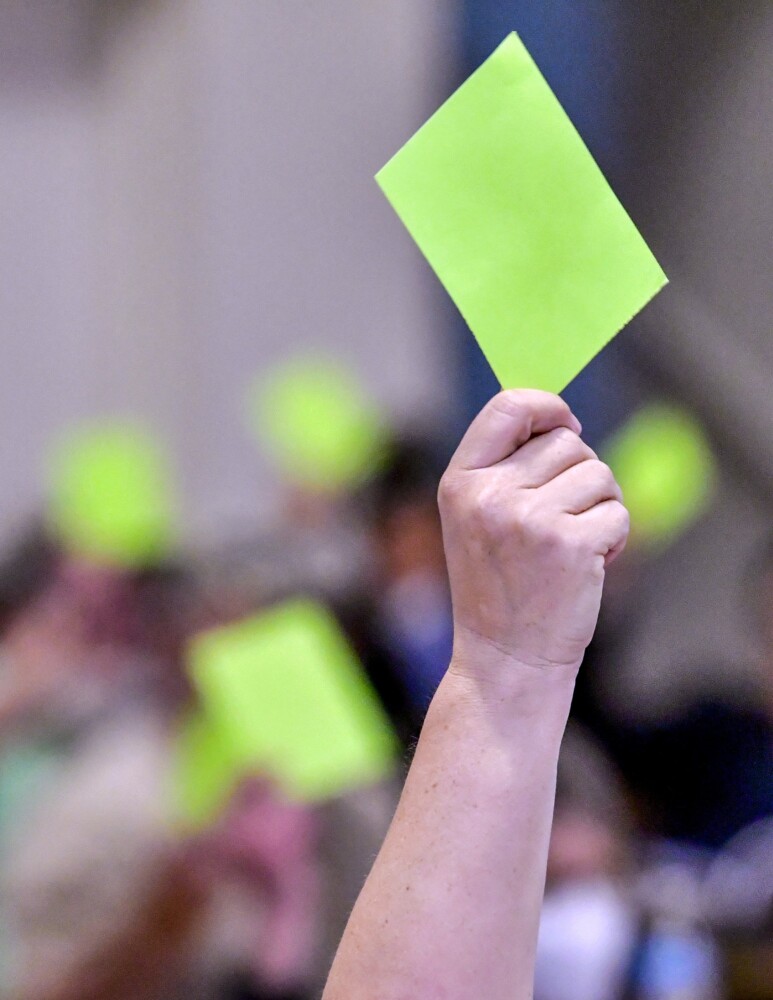WASHINGTON — While broadband expansion in town was expected to garner much discussion among voters Saturday, debate instead focused on the wording of a land use ordinance.

More than 60 people — including some not registered to vote in Washington — gathered Saturday at the Prescott Memorial School for the annual Town Meeting. Voters were asked to approve roughly $1.76 million in spending, though some funds would have come from other accounts fees, and not necessarily directly impact the amount raised through property taxes.
Three warrant articles dealing with expanding broadband coverage in town all passed unanimously without discussion. One woman in the audience suggested the crowd give the broadband committee a round of applause for their efforts on behalf of the town.
Nearly all warrant articles passed unanimously, but No. 45 proved a sticking point for some. The article sought to update the town’s land use ordinance to include new language allowing the use of buildings for events. Discussion lasted about a half hour and before an amendment was offered to move the vote to the June primary, which would allow time to gather more information.
The updated land use ordinance specifically impacted Richard and Lynne Bartlett, a couple from southern Maine who attended the town meeting specifically to discussion over article 45. The couple owns 15 isolated acres on West Washington Road where they plan to host weddings, parties and other events at a renovated barn.
“We wanted a big enough space where we wouldn’t bother people,” Richard Bartlett told the Kennebec Journal. “We did have some concern over noise and cars on the street, but most people don’t drive to weddings and shuttle in.”
For the Bartlett’s barn to become a wedding venue, they had to apply for a zoning change for a social event barn. He explained the ordinance language is too ambiguous and needed to be revised.
When it came time to discuss the article, attendees were more concerned over the way the ordinance was worded in the article and suggested they vote on the four specific parts of the ordinance separately instead of as a whole ordinance. Some people mentioned the ordinance had “too many” sections to vote on.
The updated ordinance included language “to increase CEO-only review for nonresidential structures up to 2,000 square feet from 1,500 square feet in size,” to “require a building permit for all size structures, but maintaining a fee only for structures over 240 square feet,” “allow event centers in the rural and commercial zones” and “allow event centers in the farm and forest zone with a special requirement of 15 acres minimum for that size use.”
Ultimately, it was decided to table article 45 until the June 14 primary when more information could be given and residents could vote for each part of the ordinance.
“I guess I’ll have to wait until June,” Richard Bartlett said after the vote did not happen.
The ordinance on “Dog Animal Control” generated some discussion as well. The updated ordinance under article 44 added language to be more inclusive of the domestic animals the animal control officer has the ability to maintain, if there is a complaint.
One resident said expanding the ordinance and shying away from just dogs and cats makes the motion “too broad,” suggesting it would also include chickens that roam in addition to domesticated farm animals and suggested amending the motion to keep it as it is, specifically to dogs and cats. That motion failed. The motion that passed included a yearly review to see if the animal control officer did in fact have to tame other animals.
Article 26 included an ambulance fee of $117,290. Jesse Thompson spoke on behalf of the ambulance service, explaining the rising costs are mainly for payroll so they can ensure they have EMTs and paramedics.
Article 7, which sets the due date for town taxes, was amended from Oct. 1, a Saturday, to Oct. 3, a Monday, so the town office will be open. The maximum interest rate on the taxes is 4%. Article 20 was also amended to cap the Road Maintenance Reserve rollover account transfer at $10,000. There was no maximum number previously.
There was no other discussion at the meeting, only residents who asked for more information on certain articles. It was clarified on article 28 and article 29, that McDowell Road would be paved.
A Budget Committee made up of Wendy Carr, David Martucci, David Williams, Jesse Casas, Kathleen Ocean, Donald Drinnell and Peg Hobbs were chosen by the select board, with Deborah Bucko and Shawn Donahue named as alternatives.
Select board member Wesley Daniel won the Spirit of America Award.
Send questions/comments to the editors.









